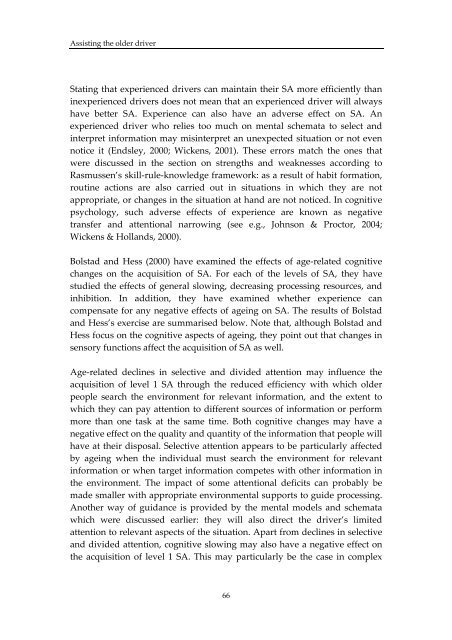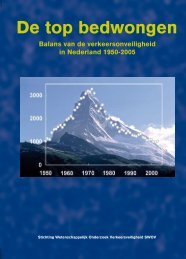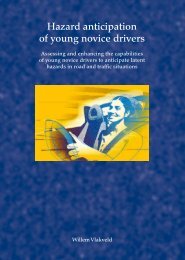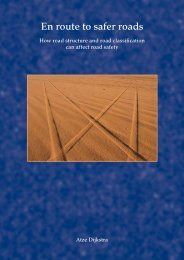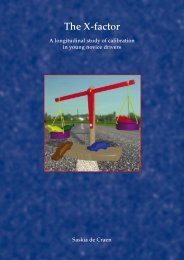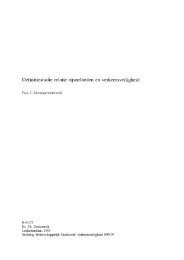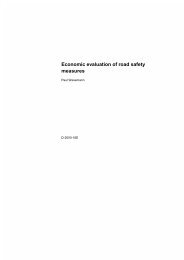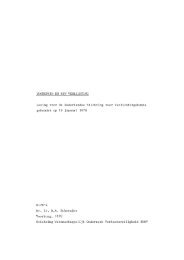Assisting the older driver - SWOV
Assisting the older driver - SWOV
Assisting the older driver - SWOV
Create successful ePaper yourself
Turn your PDF publications into a flip-book with our unique Google optimized e-Paper software.
<strong>Assisting</strong> <strong>the</strong> <strong>older</strong> <strong>driver</strong><br />
Stating that experienced <strong>driver</strong>s can maintain <strong>the</strong>ir SA more efficiently than<br />
inexperienced <strong>driver</strong>s does not mean that an experienced <strong>driver</strong> will always<br />
have better SA. Experience can also have an adverse effect on SA. An<br />
experienced <strong>driver</strong> who relies too much on mental schemata to select and<br />
interpret information may misinterpret an unexpected situation or not even<br />
notice it (Endsley, 2000; Wickens, 2001). These errors match <strong>the</strong> ones that<br />
were discussed in <strong>the</strong> section on strengths and weaknesses according to<br />
Rasmussen’s skill‐rule‐knowledge framework: as a result of habit formation,<br />
routine actions are also carried out in situations in which <strong>the</strong>y are not<br />
appropriate, or changes in <strong>the</strong> situation at hand are not noticed. In cognitive<br />
psychology, such adverse effects of experience are known as negative<br />
transfer and attentional narrowing (see e.g., Johnson & Proctor, 2004;<br />
Wickens & Hollands, 2000).<br />
Bolstad and Hess (2000) have examined <strong>the</strong> effects of age‐related cognitive<br />
changes on <strong>the</strong> acquisition of SA. For each of <strong>the</strong> levels of SA, <strong>the</strong>y have<br />
studied <strong>the</strong> effects of general slowing, decreasing processing resources, and<br />
inhibition. In addition, <strong>the</strong>y have examined whe<strong>the</strong>r experience can<br />
compensate for any negative effects of ageing on SA. The results of Bolstad<br />
and Hess’s exercise are summarised below. Note that, although Bolstad and<br />
Hess focus on <strong>the</strong> cognitive aspects of ageing, <strong>the</strong>y point out that changes in<br />
sensory functions affect <strong>the</strong> acquisition of SA as well.<br />
Age‐related declines in selective and divided attention may influence <strong>the</strong><br />
acquisition of level 1 SA through <strong>the</strong> reduced efficiency with which <strong>older</strong><br />
people search <strong>the</strong> environment for relevant information, and <strong>the</strong> extent to<br />
which <strong>the</strong>y can pay attention to different sources of information or perform<br />
more than one task at <strong>the</strong> same time. Both cognitive changes may have a<br />
negative effect on <strong>the</strong> quality and quantity of <strong>the</strong> information that people will<br />
have at <strong>the</strong>ir disposal. Selective attention appears to be particularly affected<br />
by ageing when <strong>the</strong> individual must search <strong>the</strong> environment for relevant<br />
information or when target information competes with o<strong>the</strong>r information in<br />
<strong>the</strong> environment. The impact of some attentional deficits can probably be<br />
made smaller with appropriate environmental supports to guide processing.<br />
Ano<strong>the</strong>r way of guidance is provided by <strong>the</strong> mental models and schemata<br />
which were discussed earlier: <strong>the</strong>y will also direct <strong>the</strong> <strong>driver</strong>’s limited<br />
attention to relevant aspects of <strong>the</strong> situation. Apart from declines in selective<br />
and divided attention, cognitive slowing may also have a negative effect on<br />
<strong>the</strong> acquisition of level 1 SA. This may particularly be <strong>the</strong> case in complex<br />
66


